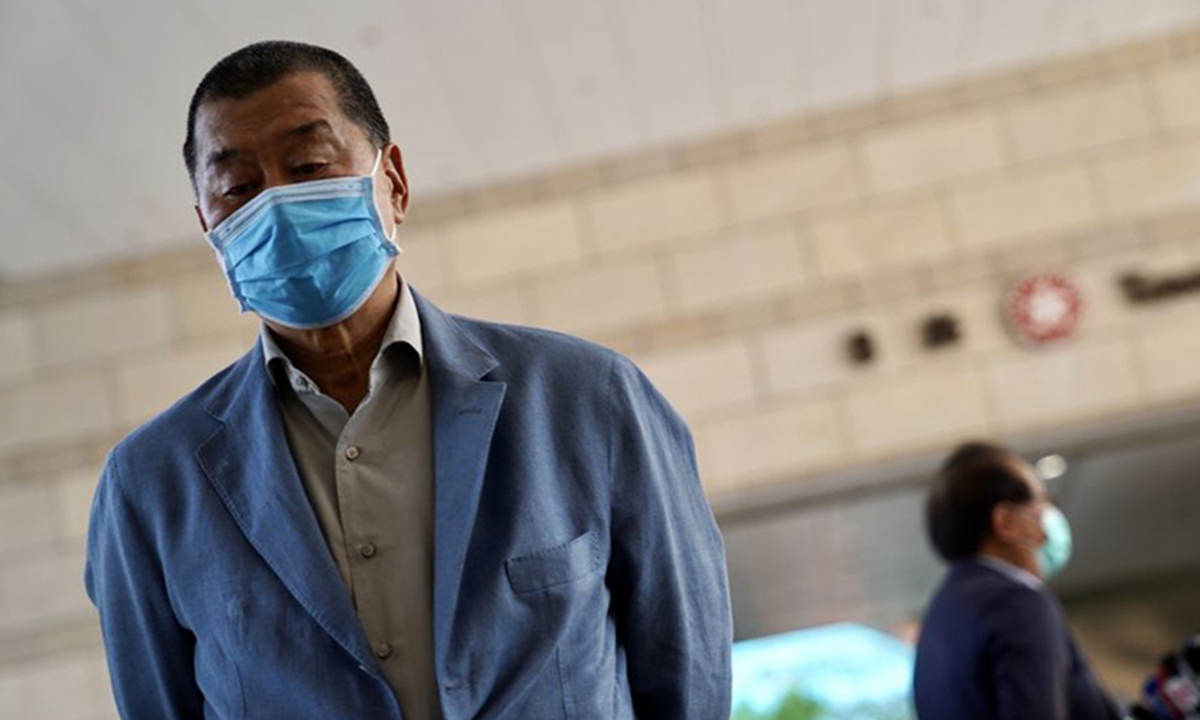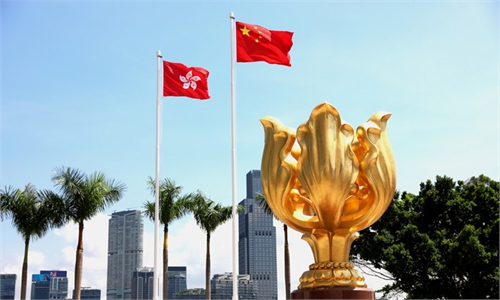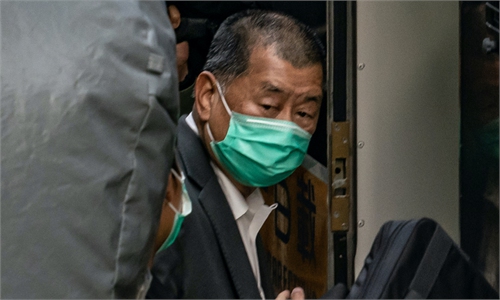
Photo taken on May 5, 2020 shows Jimmy Lai Chee-ying appearing in court on unauthorized assembly charge in Hong Kong, China. (Xinhua/Lui Siu Wai)
The Hong Kong Special Administrative Region (HKSAR) government is expected to launch a legal amendment to prevent London-based barrister Timothy Owen from defending infamous media tycoon Jimmy Lai in a national security trial, according to media reports. Some legal experts and sources close to the HKSAR government confirmed with the Global Times on Monday that it's highly likely that this work will start soon.
The move came after the legal interpretation for provisions under the National Security Law (NSL) for Hong Kong by the National People's Congress Standing Committee, the country's top legislature, which clarifies confusions and sets the tone after Hong Kong's top court allowed Lai to hire an overseas lawyer to defend him, posing risks of leaks of national secrets.
Answering a query on when the HKSAR government will start to carry out the relevant amendments following the legal interpretation, Senior Counsel Ronny Tong Ka-wah, who also sits on the government's key decision-making body, the Executive Council, told the Global Times: "Soon, I suspect."
Louis Chen, a member of the Election Committee and general secretary of the Hong Kong Legal Exchange Foundation, also told the Global Times that it's highly likely that the HKSAR is seeking to pass legal amendments within "months" to prevent the British barrister from defending Lai.
John Lee, the Chief Eexecutive of the HKSAR government who chairs the city's Committee for Safeguarding National Security, will call a meeting in the near future during which the body is expected to lay down a framework to resolve the dispute by seeking amendments to the Legal Practitioners Ordinance, according to the South China Morning Post.
Following the interpretation, Lee said on Friday that the HKSAR government will implement the judgments and decisions made by the committee on the relevant issues, and actively consider proposing amendments to the Legal Practitioners Ordinance.
Hong Kong officials, legal professionals and observers welcome the country's top legislature's interpretations for provisions under the NSL for Hong Kong, which absolutely does not affect the city's judicial independence, but instead clarifies the legislative intent of a number of provisions of the NSL for Hong Kong, providing more authoritative and clear guidelines for the judicial practice of the HKSAR.
Stephen Wong Yuen-shan, the head of the new CE's Policy Unit, told the Global Times on Monday that he supports and welcomes the top legislature's interpreting the NSL for Hong Kong in accordance with the Constitution and the NSL, clarifying the meaning of the relevant provisions and establishing the principle to ensure that the HKSAR authorities more accurately implement the NSL for Hong Kong.
"It has great significance in further improving the legal system and enforcement mechanism in safeguarding national security," Wong said.
Foreign lawyers are welcome to take part in cases not involving endangering national security, and no matter how the amendments are made, they won't affect foreign lawyers who obtain specific approval from local courts to take part in non-national security cases in the future, Lee told reporters on Friday evening, stressing that the legal interpretation this time has a specific scope.
The legal interpretation itself is based on the clarification and shaping of the institutional structure and legal procedures, providing a normative legal toolbox and operational guidelines for local legal institutions in law enforcement, Tian Feilong, a legal expert at Beihang University in Beijing, told the Global Times on Monday.
"It's not giving a direct solution to a specific individual case, but providing guidelines, showing the central government's respect for and trust in local institutions in Hong Kong," he said.
Besides, the interpretation provides an authoritative basis for the adoption of relevant legal actions in Hong Kong, providing guidance and requirements for the revision of the specific provisions of the Legal Practitioners Ordinance, and it is necessary to establish a supervision and restriction mechanism for the discretion of judges in national security cases, Tian said.



